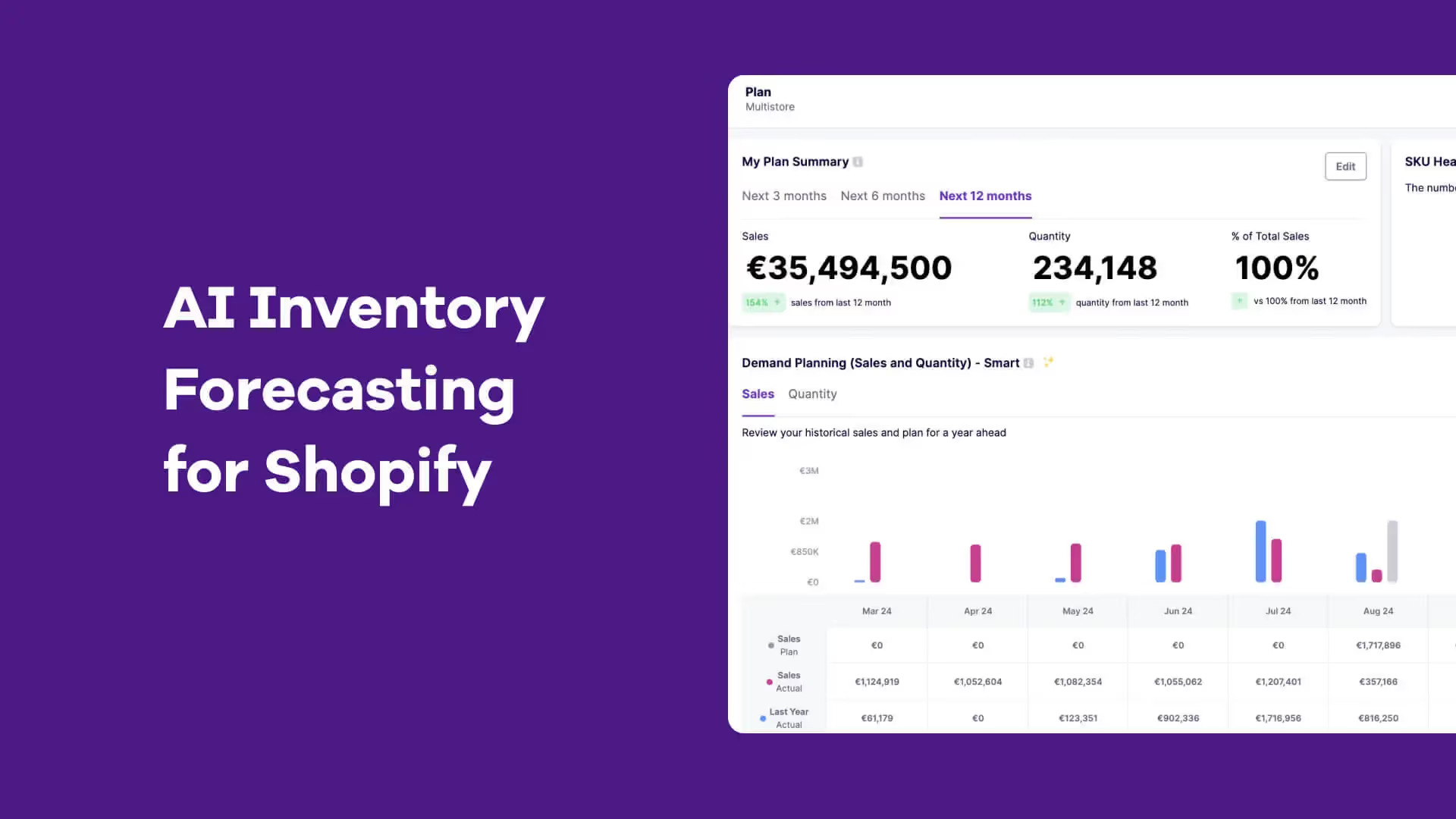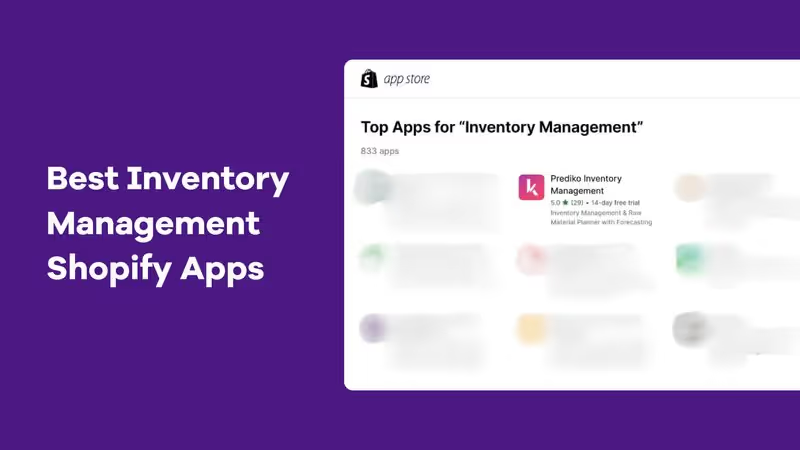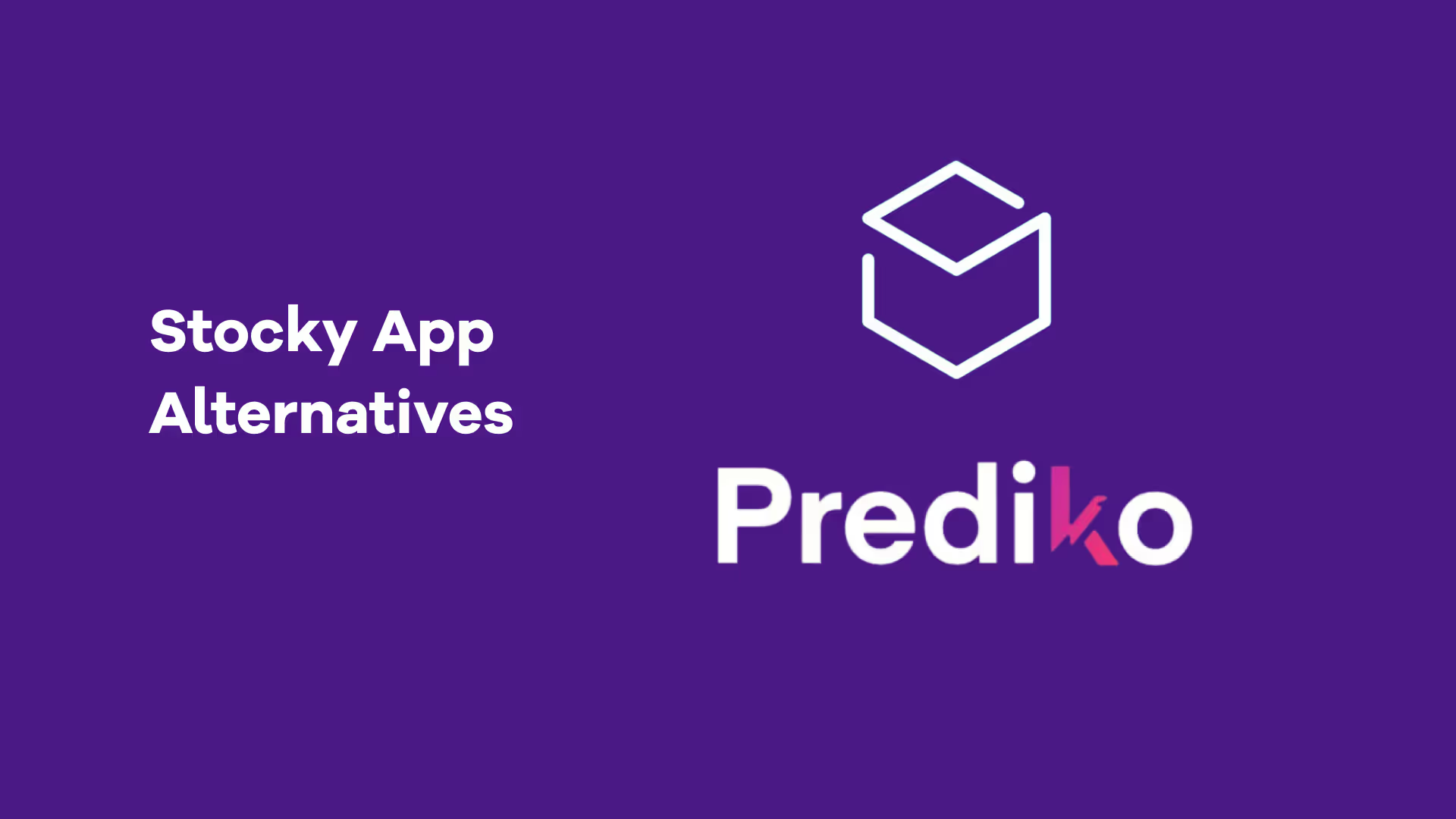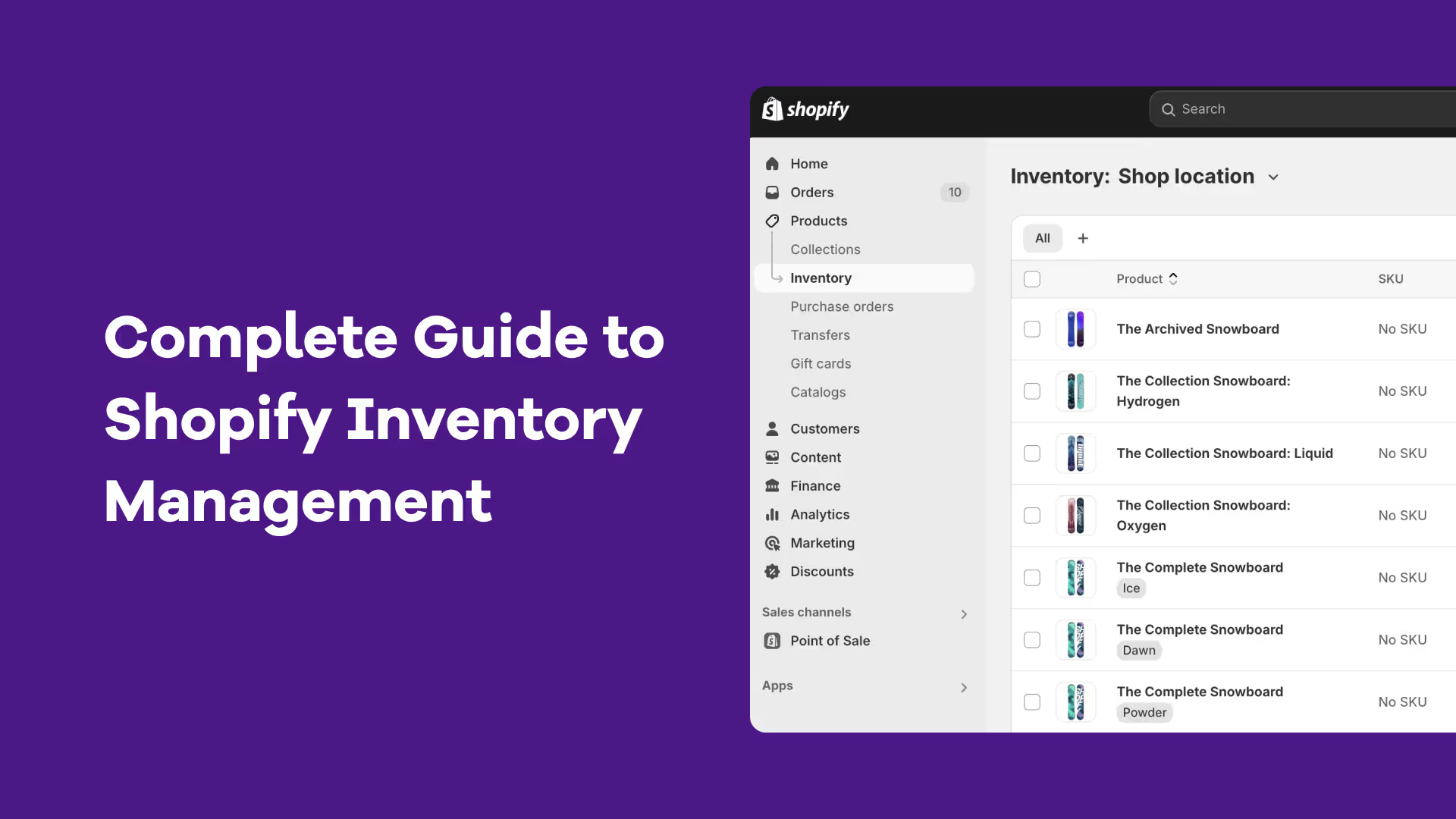Do all your inventory decisions feel like a gamble and you either battle stock outs or draw in excess stock? If you can’t accurately predict your inventory needs, each mistake can cause production delays, sales, and customer trust.
This was the reality for Bright Body, a handcrafted wellness product brand until they discovered AI-based forecasting. By adopting a simple, reliable, data-driven way to manage inventory, they moved from guesswork to precision, saved countless hours, and reduced decision fatigue.
review.avif)
If you're looking to optimize inventory planning for your Shopify brand, this article is for you. Discover how Prediko's AI inventory forecasting can help you manage your stock levels, streamline your operations, and boost profitability.
Why are traditional inventory forecasting tools not cutting it for Shopify business owners?
1. Difficulty in handling complex variables
Most ecommerce store managers use spreadsheets to produce forecasts, which do not have capabilities to analyze more complex variables such as seasonal trends, market fluctuations and promotional events. These variables add complexities that non-AI tools cannot handle.
Moreover these tools rely on simplistic models such as moving averages, linear regression or basic time series analysis.
These methods do not capture the patterns that arise when these variables interact with each other, affecting inventory planning. For example, if the tool cannot analyze the inventory needed if a promotional event affects seasonal sales by calculating the relationship between each other then it may lead to stock outs.
2. Lack of Real-Time Data Integration
Many traditional forecasting methods rely on periodic data updates, leading to outdated information and reactive decision-making. Without real-time integration, businesses can't respond swiftly to market changes.
CloudSharks was facing this problem until they partnered with Prediko. CloudSharks was using a rudimentary inventory management solution that usually recommended how many SKUs to order. However, the solution calculated expected orders using current volume and velocity, without accounting for forward-looking variables.
With Prediko they were able to better predict inventory needs as the AI incorporated current sales volumes and combined it with expected sales over 12 months to provide accurate recommendations on how much to order.
3. Slow, manual and error prone
While spreadsheets are a powerful tool to keep track of smaller inventories with a few SKUs, it’s not recommended for fast-growing brands that manage diverse products and variants.
Related Reads: Shopify Variant Inventory Tracker: Automate to Reduce Manual Oversight
With complex formulas and tedious manual entries, the practice often leads to errors and discrepancies despite your best efforts. By the time your formulas give you predictions for the following week, your bestseller is most likely out of stock already and your inventory supplier won’t make it in time.
How AI solves these challenges?
AI tools like Prediko summarise several areas of the inventory management process – like quantities, costs, order tracking, and purchase order management – in an easy-to-use dashboard. For brands looking to replace guesswork with precision, embracing AI in inventory management enables data-driven forecasting that reduces both stock outs and overstocking. Using sales history and trends, these tools provide accurate demand forecasts, and help Shopify businesses optimize stock levels and scale with confidence.
1. AI algorithms can handle vast amounts of complex data
Machine learning (ML) algorithms excel at processing and analyzing large datasets. Technologies like neural networks and decision trees can identify complex patterns and relationships within the data, providing more accurate forecasts.
2. Integrate with databases and update date automatically
AI solutions can integrate with databases, Shopify stores and update forecasting based on real-time data, seasonal trends, etc. For example, Prediko integrates with Shopify stores, analyzes your historical sales data using our proprietary AI that’s trained on 25+ million SKUs, and generates a 12-month “Demand Smart Plan”.
.avif)
3. No lag in accuracy of forecasting with increase in volume
AI solutions are highly scalable, handling higher volumes of SKUs without compromising speed and accuracy.
These algorithms can quickly process complex data and identify patterns. Whether you have a single Shopify store or multiple stores, AI can process data with ease enabling you to scale your business without adding additional capabilities to process higher volumes of data.
Also Read: How to Setup and Optimize Shopify Multi-Location Inventory?
Kate Hewko uses Prediko’s AI to streamline inventory management across its two warehouses. Prediko helped the online beauty store streamline its procurement process and its AI-driven inventory forecasting ensures stock replenishments happen on-time across all locations.
Similarly, Kimai, an online jewelry brand, used Prediko to integrate its three Shopify stores and assimilated their historical sales, revenue, and product data in a single platform. Through Prediko’s forecasting features, the brand reduced delivery time by 43% and production costs by 11%.
There is a lot of change happening in the way Shopify brands forecast inventory.
How Can Shopify Brands Implement AI in Inventory Forecasting?
1. Deciding on the External and Internal Variables
Identify key external variables such as economic indicators and seasonal trends, and internal variables like past sales data and current stock levels.
These variables significantly influence forecast accuracy. You can extract the data for external variables from government websites, Nielsen’s insights, etc. You can gather data for internal variables from Shopify’s built-in analytics tools and the order management systems.
2. Preprocessing, Cleaning, and Integration of Data
High-quality data is essential for accurate forecasting. Preprocessing steps include handling missing values, removing duplicates, identifying outliers, and normalizing data. Data preprocessing enhances the reliability of these forecasts. For example, outliers such as a sudden spike in sales due to a one-time promotional event must be removed so that the AI is able to generate an accurate inventory plan.
3. Selecting Right Forecasting Model
Choose from various forecasting models such as time series models (ARIMA, Exponential Smoothing) and machine learning models (Random Forest, Neural Networks). You must understand the nature of your sales data and the complexity of your inventory when selecting the right model.
4. Training Your Model
Train your model by splitting your data into training and testing sets, tuning model parameters, and evaluating performance.
Avoid overfitting by validating the model’s accuracy using techniques like cross-validation.
5. Piloting the AI System Before Implementing
Running a pilot program helps identify potential issues and understand system limitations. Set up a pilot by defining success metrics and gathering stakeholder feedback, ensuring a smooth transition to full implementation.
6. Integrating with Different Solutions
Ensure seamless integration of the AI system with existing tools and platforms like ERP systems, inventory management software, and sales channels. This integration maximizes the benefits of AI-driven forecasting.
By accurately predicting demand, businesses can reduce excess stock, avoid stockouts, and improve cash flow. Just like optimizing inventory, businesses also need meeting rooms to rent to ensure efficient resource allocation, reducing unnecessary costs while maintaining flexibility.
Learn the difference between supply planning and demand planning.
How Prediko’s AI forecasting Helps Shopify Businesses?
Don’t let outdated forecasting methods hold your business back. Embrace the power of AI with Prediko and make data-driven decisions to keep your growth on track.
1. Smart inventory management
Avoid spoilage by ensuring that products are sold and replenished before they expire, reducing waste and maximizing profitability. Prediko’s AI-powered capabilities analyze huge data including historical sales, market trends, and customer behavior.

2. Make informed purchasing decisions
With Prediko, you can manage your inventory and place purchase orders based on accurate, real-time insights. Reduce the risks of overstocking and understocking inventories, enabling you to find the right balance between demand and supply. With this balance, you can reduce business costs, optimize operations, and increase revenue.
.avif)
3. Distribute sales across each month throughout the year
Prediko simplifies distributing sales forecasts across each month, also factoring in the seasonal fluctuations in customer demand. Based on these insights, Prediko creates a smart plan for you using AI forecasts for sales and SKU quantities.
.avif)
By providing a monthly breakdown of expected sales, Prediko helps you effectively plan your inventory purchases at a granular level. You can then maintain a smooth inventory flow and minimize disruptions to your supply chain processes and operations.
Maintain consistent stock levels and avoid the pitfalls of overstocking during slow periods or understocking during peak times.
4. Create actionable for the operations team
Once you create your plans for the specific period, Prediko offers recommendations and actionable insights for your sales and revenue operations teams. These insights help you streamline how you procure goods, optimize stock levels, and improve the overall efficiency of your inventory management.

For instance, Prediko recommends specific reorder points and quantities based on its forecasts. This ensures that you replenish your inventory at the right time and in the right amounts, reducing the risk of stockouts and overstock situations. Additionally, by providing clear, actionable recommendations, Prediko helps your team stay aligned and focused on meeting inventory goals.
Many brands pair AI with a solid Shopify safety stock strategy — keeping a small buffer of high-priority SKUs on hand to stay protected when things don’t go as planned.
See how Prediko works














